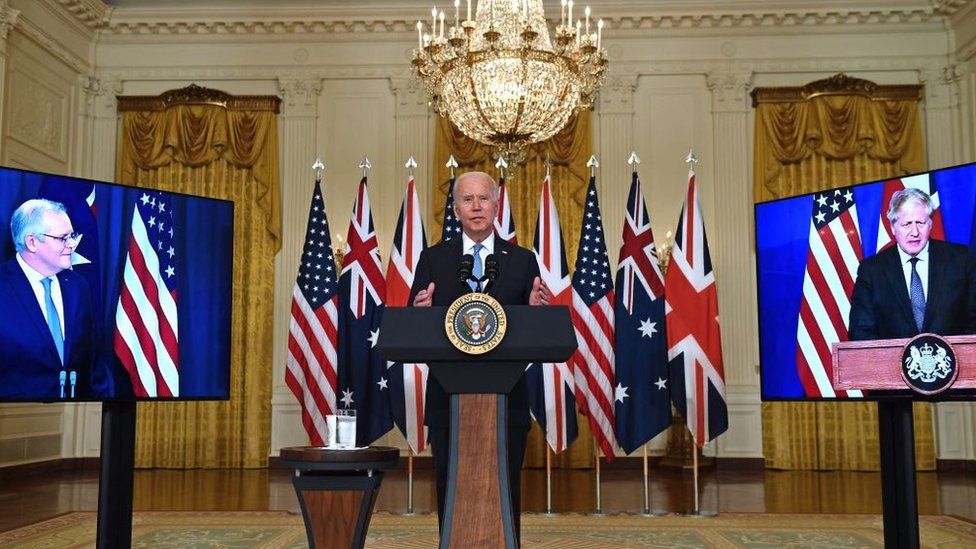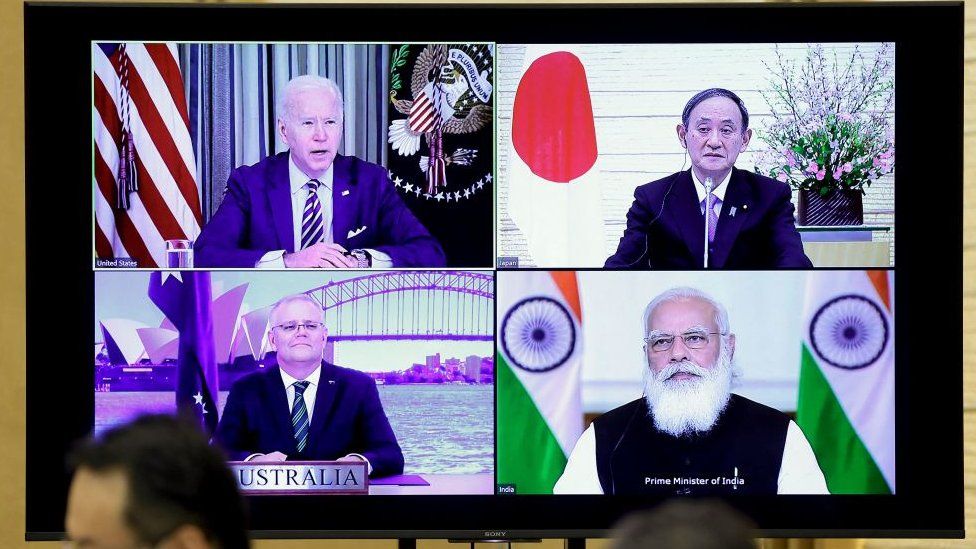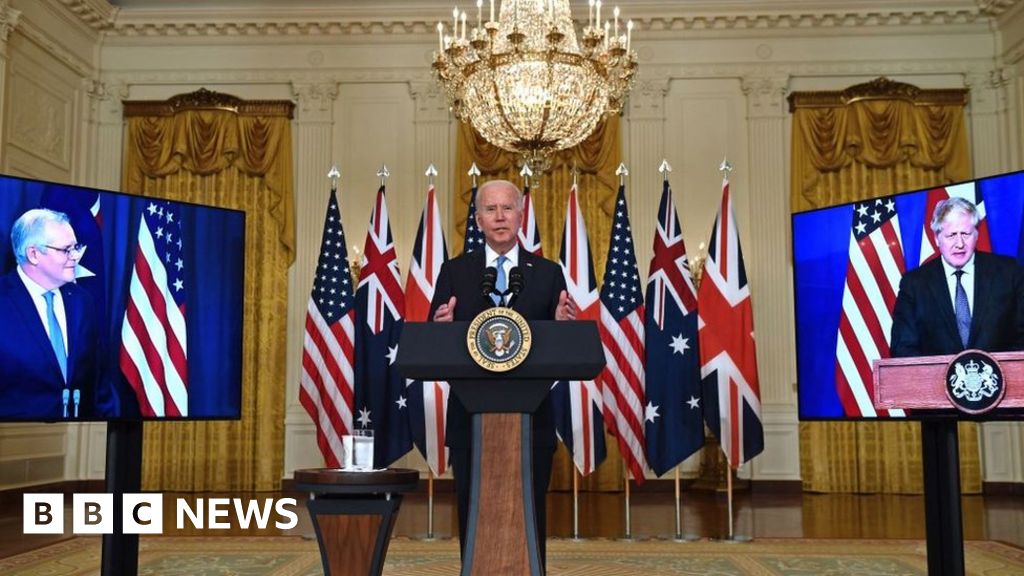
A new security partnership in the Asia Pacific will see the UK and US provide Australia with the technology and capability to deploy nuclear-powered submarines. American officials have said the move was not aimed at countering Beijing. However experts say the AUKUS agreement signals a paradigm shift in strategy and policy across the region.
The timing of the new deal is particularly significant. It comes just a month after the US exit from Afghanistan, when doubts have been raised in multiple quarters about US commitment in the region.
Britain too is eager to be more involved in the Asia-Pacific especially after its exit from the European Union and Australia is increasingly concerned about China’s influence.
“It is a ‘big deal’ because this really shows that all three nations are drawing a line in the sand to start and counter the Chinese Communist Party’s (CCP) aggressive moves in the Indo-Pacific,” Guy Boekenstein, senior director of Defence and National Security at Australia’s Northern Territory government told the BBC.
“It also publicly demonstrates our combined stance on this and commitment to a stable and secure Indo-Pacific region – one that for the past 70 years has led to the prosperity of all in the region, including China’s economic growth.”
What does the agreement involve?
The agreement involves the sharing of information and technology in a number of areas including intelligence and quantum technology as well as the acquisition of cruise missiles.
But the nuclear submarines are key. They are to be built in Adelaide in South Australia and will involve the US and the UK providing consultation on technology for their production.
“A nuclear submarine has enormous defence capabilities and therefore ramifications for the region. Only 6 countries in the world have nuclear submarines. They are a really powerful deterrent capability without giving them nuclear weapons,” Michael Shoebridge, Director of Defence, Strategy and National Security at the Australian Strategic Policy Institute said.
Nuclear submarines are much more stealthy than conventional ones – they operate quietly, are able to move easily and are harder to detect.
At least eight submarines will be supported, although it’s not clear when they will be deployed. The process will take longer due to a lack of nuclear infrastructure in Australia.
They will not be nuclear armed, only powered with nuclear reactors.
“Let me be clear: Australia is not seeking to acquire nuclear weapons or establish a civil nuclear capability,” Australia’s Prime Minister Scott Morrison said.
President Biden added that there would be an initial 18-month consultation period with teams from the three countries to decide how it would work and to ensure compliance with non-proliferation commitments.
However, the move does show that the US and UK are willing to take the big step of exporting nuclear technology to a non-nuclear powered nation, according to Yun Sun, Co-Director of the East Asia Programme at the Stimson Center.
And that is what makes the partnership so unique.
“This technology is extremely sensitive. This is frankly an exception to our policy in many respects, I do not anticipate that this will be undertaken in other circumstances going forward. We view this as a one-off,” a U.S. official told Reuters, adding that Washington had shared nuclear propulsion technology only once before – with Britain in 1958.
How will Asia react?
In recent years, China has demonstrated increasing power and influence in the region.
“We hear words about co-operation and then we see the threats against Taiwan and events in Hong Kong and the rapid militarisation of the South China Sea. So really when it comes to strategic issues, deterrents seem to be the only thing that makes sense against China,” Mr Shoebridge said.
The US has been investing heavily in other partnerships in the region too with Japan, South Korea, Thailand and the Philippines, as well as India and Vietnam.
This deal could benefit all of them, according to Mr Shoebridge, in the face of concerns about China’s growing power.
“The region will appreciate that. This is part of a geopolitical shift which is driven by one big thing. And that is the direction that Xi Jinping is taking. This announcement fits with the growing participation of the world’s biggest democracies to deter China from using its power” Mr Shoebridge added.
The response has reportedly been positive, even if it has been a quiet recognition.

Bonnie Glaser, director of the Asia program at policy think tank the German Marshall Fund said: “My understanding from people in the administration – having talked to allies and partners who have an interest in peace and security in the Indo-Pacific – is that there was nothing negative. There is support in the region for deterrence and for having US presence and military presence in the region.”
What does it mean for Australia-China relations?
One relationship that will undoubtedly change as a result of the agreement is the one between China and Australia.
The two nations have been strong trade partners in the past with a large number of Chinese students choosing to study in Australia.
However, political relations deteriorated after Australia backed a global inquiry into the origins of the coronavirus.
The pact shows Australia is aligning itself with the US and UK but also signals a vote of confidence in Australia which is looking to play a more active role in Asian security.
“Just because Australia has nuclear submarines doesn’t mean it is more powerful than China. It does change the balance of power in the region. If China does face a security situation in the South China Sea or Taiwan Strait, it will affect the military preparedness or response that China will have to prepare for. It does change the power equilibrium in the region,” Ms Sun told the BBC.
In response to the deal, China’s embassy in Washington said the governments involved “should shake off their Cold-War mentality and ideological prejudice”.
However, the reaction on the mainland might be even stronger.
“What’s Chinese for apoplectic? One can expect a fiery-hot reaction from Beijing…This gives Australia and the US another tool in the toolbox to deter China,” William Choong Senior Fellow, Regional Strategic and Political Studies ISEAS-Yusof Ishak Institute said.
